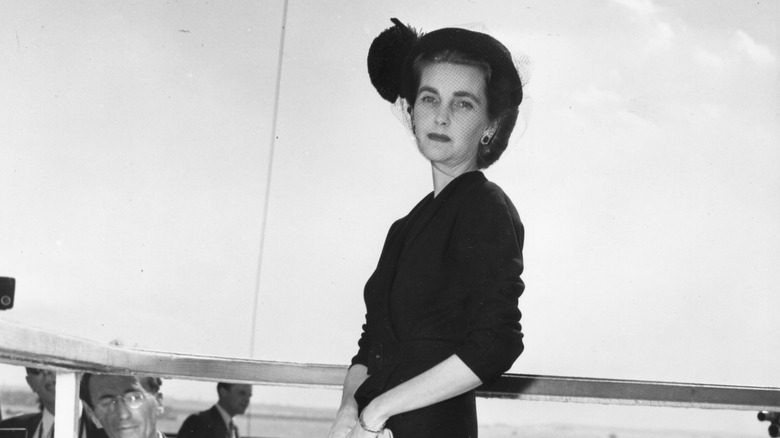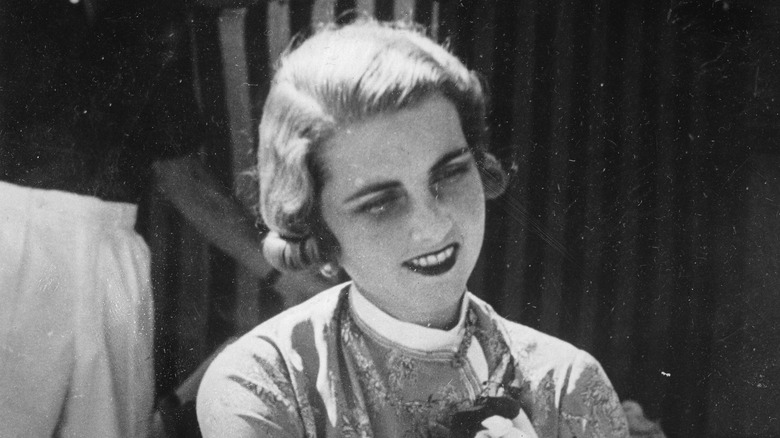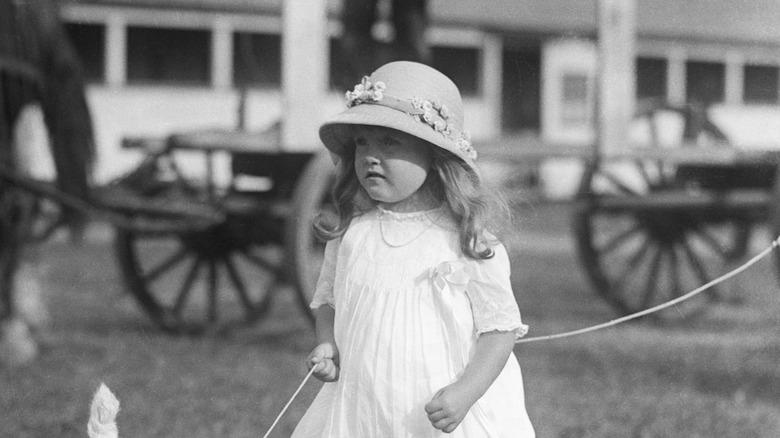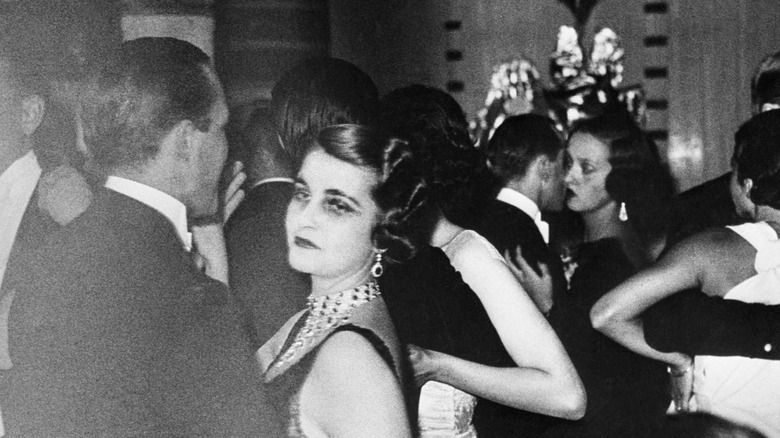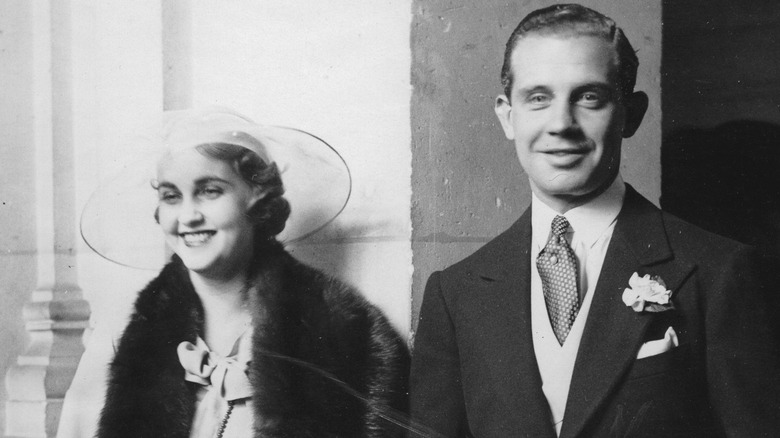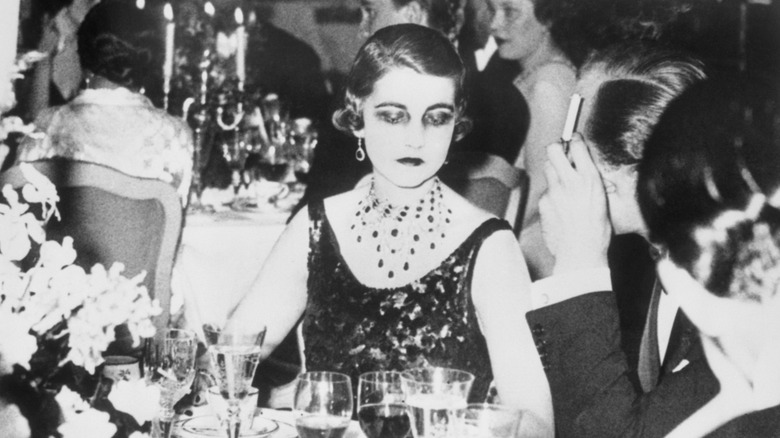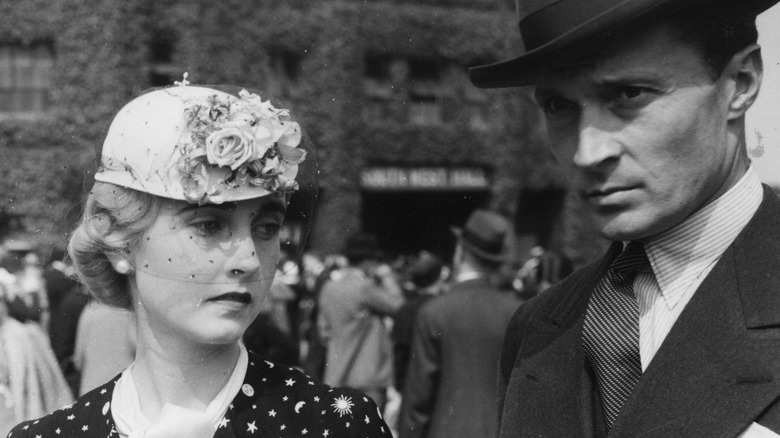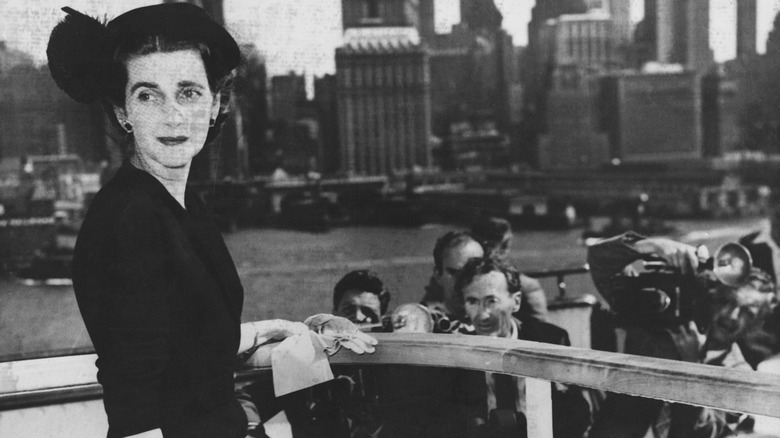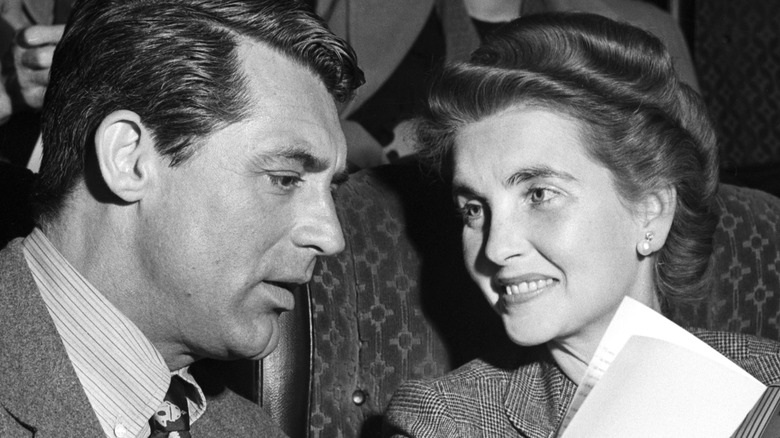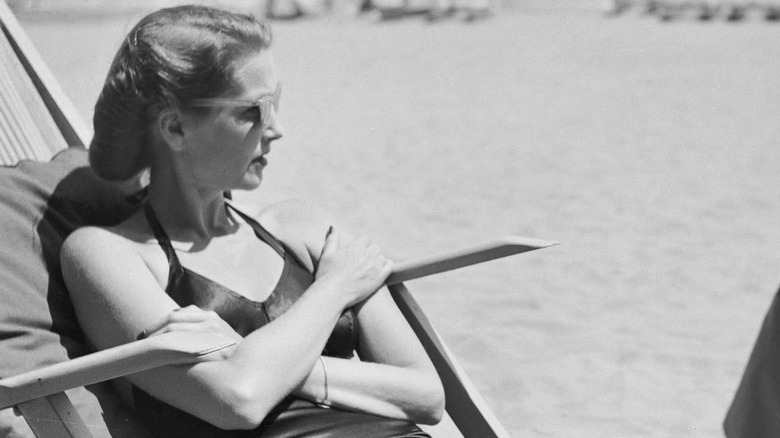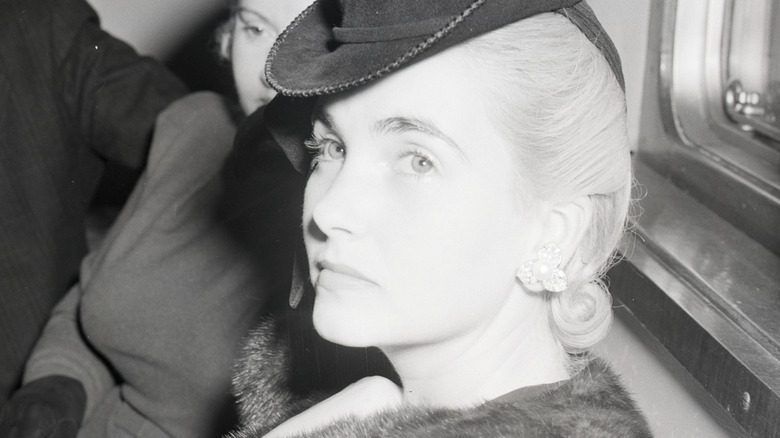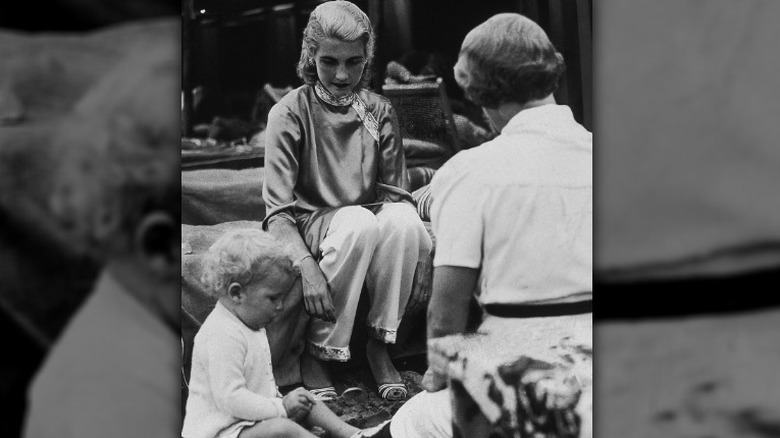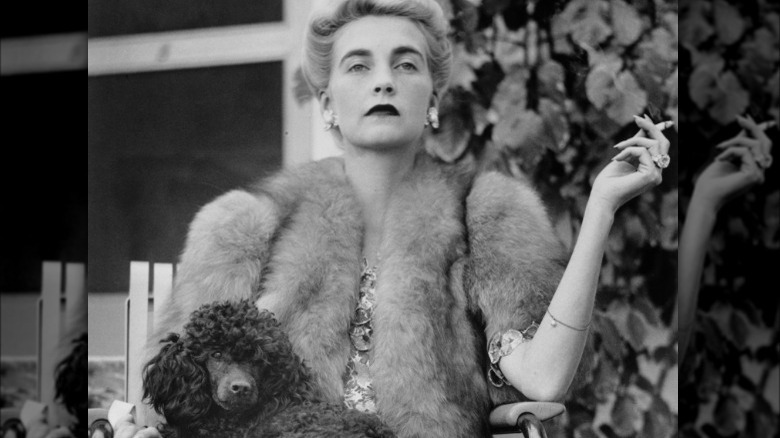The Tragic Life Of Barbara Hutton
Barbara Hutton was the heiress to two fortunes and one of the richest women in the world. Over the course of her life, she married Hollywood's favorite leading man, an infamous con artist, and several princes. From the time she turned 18 in 1930, Hutton was constantly in the press, alternately depicted as a villain, a spoiled child, a tragic recluse, and a punchline.
Hutton's plight was controversial. While she was obviously miserable, few sympathized with the apparent struggle of being extraordinarily wealthy and famous, and the press dubbed her "poor little rich girl," a title that would follow her for the rest of her life.
After writing a snarky joke about her failed marriages in his column, Dean Southern Jennings received a personal call from Hutton, demanding to know why he would say something like that about her. In "Barbara Hutton: A Candid Biography," the biography of Hutton that Jennings went on to write, he described how during their first conversation she expressed how sad and frustrated she was that despite the near-constant coverage of every element of her life, she felt like no one in the world knew the real Barbara Hutton.
The following article contains descriptions of eating disorders, grief, domestic abuse, and risky drug use.
Hutton felt like she was drowning
Despite her massive fortune and apparently charmed life surrounded by staff, reporters, and a series of husbands, Barbara Hutton was always profoundly lonely. In the biography "Million Dollar Baby: An Intimate Portrait of Barbara Hutton" she is quoted as saying that she "inherited everything but love" and had spent her entire life trying to find it.
While few would consider inheriting a vast fortune to be a burden, Hutton described her experience as being the heir of an industry titan as being like, "the backwash after a great ocean liner sank to the bottom of the sea...the flotsam that came to the surface...a desperate drowning man struggling to survive in a raging sea."
Hutton was desperate for an escape that would never come. As a teenager, the usually quiet and introverted Hutton spontaneously stole a boat and sailed it out to sea. As recounted in "Poor Little Rich Girl: The Life and Legend of Barbara Hutton" she described the feeling of being alone on the ocean as euphoric. Soon, she would be taken in by the Coast Guard and assigned a bodyguard to keep her in line, who she would seduce to irritate her distant father. The rest of her life would be marked by profound loneliness, pain, loss, and tragedy, but on the deck of her stolen ship, she was free.
At age 4, Hutton discovered her mother's dead body
When Barbara Hutton was just 4 years old, her mother Edna Woolworth died unexpectedly in the family home. Her cause of death is still debated, but what is known for certain is that Hutton herself discovered the body. Hutton was a happy child before her mother's death, but discovering the body left her with lifelong trauma, and her life after that day would do little to help her heal.
"If I was incapable of love it was because I saw no love around me," Barbara Hutton is quoted as saying in her biography "Million Dollar Baby." Her father provided for her and encouraged her to buy everything she wanted, but was extremely distant and wanted little to do with her after her mother's death. She was sent to live at the enormous and extravagant Winfield Hall with her grandparents. As described in "Poor Little Rich Girl," her grandfather was going through an unknown mental illness and became increasingly paranoid and erratic as time went on. Her grandmother is believed to have been suffering from some kind of dementia and never spoke. Hutton described it as "heartbreaking and dreadful."
Her reputation was permanently ruined on her 18th birthday
When Barbara Hutton turned 18, her father threw her a party. This was no ordinary birthday party, it was a kind of debut to introduce her to New York high society. Instead, it would ruin her reputation and make her a permanent target of the press. As described in "Million Dollar Baby" the party was held at the famous Ritz Carlton hotel, and more than 1000 champagne-sipping guests enjoyed three orchestra performances and the crooning of the popular Rudy Vallee. The entire event was reported to have cost the modern-day equivalent of between $1 and 1.8 million. This extravagant display of opulence might have alienated Hutton from the public at any time, but her 18th birthday happened to come in the year 1930 when the Great Depression was in full swing in the United States. While Hutton and her guests celebrated, people all around the country were starving.
This privileged and out-of-touch event came at such a moment of national tragedy that Hutton was torn apart in the press at the very moment she entered adulthood. In the public eye, she could never be redeemed for partying while most people struggled just to survive. Hutton would later admit that her father was wrong to throw the party, as it was "a terrible slap in everybody's face."
Her first husband was a con man
Barbara Hutton was intensely lonely and longed to be around people who cared about her. Her need for love and affection was exploited by a man who would come to be known as an infamous con man: Alexis Mdivani.
Alexis Mdivani was part of a family who was known as the "Marrying Mdvanis." As described by Los Angeles Magazine, the five Mdvanis arrived in Hollywood. They became instant celebrities. They claimed to be wealthy princes and princesses from Russia (modern-day Georgia.) In reality, they were broke. They didn't have any particular talents to offer to Hollywood stars, but they did have titles. They used this as an asset in social climbing, leveraging matches with the powerful, famous, and rich. Their wealthiest target was 20-year-old Barbara Hutton. As described in "Million Dollar Baby" Hutton found Alexis extremely attractive and was charmed by his interest in her. The marriage between Alexis Mdivani and Hutton in 1933 was one of the biggest spectacles of the century. Hutton was declared a princess.
Once they were married, Mdivani turned off the charm. Only a week after their wedding, he began abusing her and complaining about her appearance. The Mdivanis were embroiled in expensive schemes, which Hutton found herself on the hook for. They divorced in 1935, but not before he had spent a significant portion of her fortune and done permanent damage to her self-esteem.
The press routinely humiliated her
When Barbara Hutton was born in 1912, the press made no mention of her birth. As quoted in "Poor Little Rich Girl" Hutton would later joke that it was the only thing she had ever done that the tabloids had chosen to ignore. From the time she was young until her death at the age of 66, Barbara Hutton was one of the most written-about people in the world. She was one of the most notorious socialites. People were fascinated by every aspect of her private life, but she was almost universally reviled by the press.
She was dubbed "America's Dollar Princess" and "poor little rich girl" by the media, and her every action was scrutinized and mined for scandalous headlines and pithy quips in the gossip columns. Many of these stories were true, but others were taken out of context, and some were entirely fictional. In 1934, Hutton became the favorite target of gossip columnist Cholly Knickerbocker who wrote a long derogatory piece about her representing the death of society. Hutton would later tell friends that the bad press had a serious impact on her and caused her to be insulted by strangers on the street. She stated that she felt like "the most hated girl in America."
She developed severe issues with food
When Barbara Hutton was 9 years old, the family butler warned her that any man who would ever want to marry her would only be interested in her money. As recounted in "Barbara Hutton: A Candid Biography" he told the child that she wasn't pretty and was too fat for anyone to be attracted to her. When she asked her father about the frightening encounter, he told her that it was probably true. By modern standards, Hutton was fairly slim, but the press considered her overweight and rarely failed to mention it in coverage of her.
On her wedding night with Alexis Mdivani, he insulted her body. Hutton promptly went on a dangerous crash diet, losing about a third of her total body weight in a very short time. As noted in "Million Dollar Baby" her appearance was complimented, but in reality, she was very sick. Although she would soon divorce Mdivani, the lifelong criticism of her body continued to affect her mental health. Even the notoriously chilly Count Kurt Haugwitz-Hardenberg-Reventlow, who would become Hutton's second husband, was disturbed by her relationship with food. On their honeymoon, Reventlow was alarmed to discover that when her weight fluctuated even slightly she would burst into tears. He began to feel guilty about his own enjoyment of food, until the two were starving together.
If you need help with an eating disorder, or know someone who is, help is available. Visit the National Eating Disorders Association website or contact NEDA's Live Helpline at 1-800-931-2237. You can also receive 24/7 Crisis Support via text (send NEDA to 741-741).
She was targeted by the FBI
Barbara Hutton's parties were often attended by minor royals and foreign nobility, and this attracted the attention of the Federal Bureau of Investigation. The FBI began investigating Hutton, in an operation codenamed "Red Rose."
As detailed in "Poor Little Rich Girl" the FBI's interest was first triggered by Hutton's friendship with Hollywood socialite Dorothy di Frasso, who was believed to have connections to Mussolini. She had also helped a friend (and future husband) Baron von Cramm, who had been imprisoned in Germany on suspicion of "homosexual acts." When Hutton and her then-husband Hollywood star Cary Grant visited Di Frasso in Mexico City, a location the FBI associated with spy rings, Hutton became a serious target. Although there was never any indication that Hutton had ever broken the law, the FBI leaked information about their investigation to the press, causing a flood of negative articles about her shortly before her marriage to Grant. While he stood by her and gave statements that she had done nothing wrong, the damage to her reputation and marriage was irreparable.
None of her romances lived up to her marriage to Cary Grant
"I was always my own worst enemy but my husbands for the most part were pretty rotten," Barbara Hutton is quoted as saying in "Million Dollar Baby." "Except for Cary Grant."
Grant was one of Hollywood's favorite leading men, and Hutton was taken with him before they even met. Her fantasy became reality, and she believed that if she and Grant fell in love he would be able to give her something she had always been looking for: genuine love. Even her six-year-old son Lance (the son of Count Reventlow) adored Grant. In 1942, they were married, and it seemed as though Hutton might finally find peace.
While they were together, Hutton was the healthiest and most stable she'd ever been. Her self-destructive streak remained, however, and soon she was attracting media attention like she always had. Grant couldn't handle it.
Despite being a massive Hollywood star, Grant was an intensely private person and Hutton was a magnet for scandal. As described in "Poor Little Rich Girl," Grant had experience being hounded by the press, but he had never experienced constant invasions of his privacy like this before. He suspected that Hutton was intentionally attracting media attention, and resented her for it. Hutton had always craved the attention of other people, and their home became the spot for around-the-clock parties. The marriage couldn't survive, and Hutton was devastated. She would later say that her life ended with her marriage.
A health crisis in her 30s made her suicidal
Barbara Hutton had been struggling with an undiagnosed illness since around the time of the birth of her son Lance. When she was 23, she became so ill that she was mostly unconscious and when she did wake up, she didn't recognize the people around her. As quoted in "Million Dollar Baby" the press seized upon this, and released photographs of her looking particularly thin and weak.
In 1945, shortly after her divorce from Cary Grant, she became sicker than she had ever been before. She described her life as "an endless period of emergency rooms and operations." Hutton stated that her personality was forever changed by this period of intense illness and that her life was never exciting again. Despite the fears of her physicians, she survived. She would later admit that although she tried to be grateful for every day, she actually wished she had died. She developed serious anxiety and was afraid to go out and do anything.
If you or anyone you know is having suicidal thoughts, please call the National Suicide Prevention Lifeline by dialing 988 or by calling 1-800-273-TALK (8255).
Hutton took pills indiscriminately
Barbara Hutton dealt with her anxiety and stress with a barbiturate called Seconal. At night they helped her sleep and during the day they made her feel disconnected from reality in a way that she enjoyed, though, as recounted in "Million Dollar Baby" they did sometimes make her fall asleep at inappropriate times, including once while having sex with her sixth husband, Baron von Cramm.
While Seconal was her drug of choice, Hutton dangerously took pills of all kinds indiscriminately, often with alcohol. In "Barbara Hutton: A Candid Biography" her doctor is quoted as saying that it was critical that there not be any medication within reach of Hutton. If there was, she would take all of it at once. On one occasion she was taken to the hospital in a coma. On another occasion, she asked a friend of her son Lance to bring her Seconal. He was unaware that there was a limit to the number of pills her doctor wanted her to take a day, and when he gave her 12, she took them all at once, risking her life.
If you or anyone you know needs help with addiction issues, help is available. Visit the Substance Abuse and Mental Health Services Administration website or contact SAMHSA's National Helpline at 1-800-662-HELP (4357).
Her beloved son died young
Barbara Hutton married a total of seven times but only had one child: Lance Reventlow. At the age of 36, he was flying in a small plane over the Rocky Mountains to get an overhead look at some land he was interested in buying. When a storm hit, the plane went down. He, and his three friends who had been on board, were all killed in the crash. As recorded in David C. Heymann's 1983 biography of Hutton, Lance's mangled body was only identified by the initials on his shirt.
Hutton initially refused to have her son's body buried but ultimately allowed Lance's wife Cheryl to have a funeral. The wake was widely attended by family and friends, including Cary Grant who had been close to Lance. Hutton herself could not bring herself to go. In the aftermath of his death, Hutton spent most of her time alone and was said to blame herself for his death. Although it had been a tragic accident, she tortured herself with the idea that if she had been a "better mother" he would have survived. At other times, Hutton refused to believe that Lance could really be gone, and would talk about him as though he was still alive.
The end of her life was horrific
All her life, Barbara Hutton had been a socialite surrounded by people. Towards the end of her life, she became a recluse. As recounted in David C. Heymann's biography of Hutton, she was extremely sick and often unable to get out of bed. She was prescribed an unusually high dosage of painkillers and sleep aids, and on more than one occasion she overdosed. She relied on her staff to do literally everything for her. Still, she always did her makeup and had her hair done.
Her care staff reported that at times, she was erratic, with wild mood swings and terrible paranoia. Possibly because of the years of being surrounded by the press prying for details of her personal life and the FBI investigating her, or perhaps simply because she was unwell, Hutton came to believe that there was a plot against her and that her room was wired with secret listening devices. Often, she believed that Lance was in the room, just out of sight.
In 1979, at the age of 66, Barbara Hutton died of a heart attack. As described by "Million Dollar Baby," her body was prepared by mortuary attendants who were not told that she was the famous heiress. The funeral was held quietly and privately. It was probably the only major event of her life since her birth that was not widely attended by reporters.
